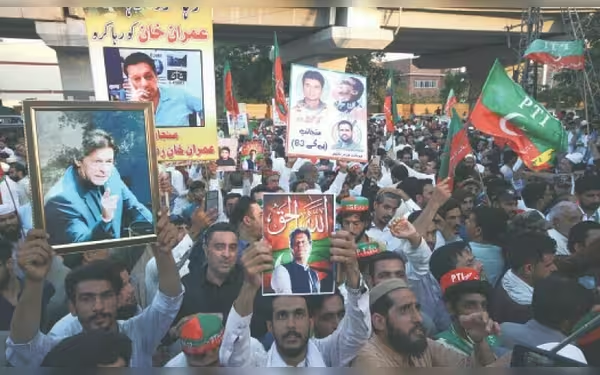Saturday, November 16, 2024 07:50 PM
PTI Protest in Rawalpindi Under Heavy Security Today
- PTI plans protest in Rawalpindi despite government restrictions.
- Punjab government imposes Section 144 to prevent gatherings.
- Local traders express concerns over potential business disruptions.
 Image Credits: dawn
Image Credits: dawnPTI prepares for a protest in Rawalpindi today amid heavy security and government restrictions on public gatherings.
In a significant development, the Pakistan Tehreek-e-Insaf (PTI) party is preparing for a protest in Rawalpindi today, amidst a backdrop of heightened security measures imposed by the Punjab government. The provincial authorities have taken drastic steps to prevent public gatherings, citing concerns over law and order. This situation has escalated tensions between the government and the PTI, a party that has been vocal about its demands for judicial independence.
The Punjab government has officially banned all public gatherings in Rawalpindi and its neighboring districts, deploying around 4,000 police personnel and calling in Rangers to assist in maintaining order. This decision comes after PTI announced its intention to hold a protest at Liaquat Bagh, a venue that has been a focal point for political gatherings in the past. However, the party's founder indicated that the government would not permit the event to take place in the city, prompting a change in plans.
In a video message released on Friday, Hammad Azhar, the acting president of PTI Punjab, emphasized the party's commitment to holding a "massive but peaceful political public gathering" at 2 PM today. He urged supporters to arrive early, recalling a previous gathering in Lahore that was forcibly dispersed by police for exceeding the allotted time. Despite the government's efforts to thwart their plans, PTI leaders remain resolute, vowing to gather at Liaquat Bagh "despite all hurdles." However, the reality of the situation suggests that reaching the venue may prove challenging.
According to a senior police official, Rawalpindi Police, along with the Rangers and Punjab Constabulary, have devised a strategy to "lay a virtual siege" to the city. This includes blocking all traffic in and out of Rawalpindi with containers and barbed wire, effectively isolating the area. The top police official stated, "Extraordinary security measures have been taken to ensure peace in the city, and nobody will be allowed to stage any protest." This statement underscores the government's determination to maintain control and prevent any potential unrest.
On the eve of the protest, deputy commissioners from Rawalpindi, Jhelum, Chakwal, and Attock districts submitted a request to the Punjab Home Department to impose a ban on all gatherings. This request was swiftly granted, leading to the enforcement of Section 144 of the Code of Criminal Procedure, 1898, which prohibits various forms of public assembly, including protests and demonstrations. The deputy commissioners expressed concerns that miscreants might exploit the situation to engage in "subversive/anti-state activities."
Dr. Hassan Waqar Cheema, the Deputy Commissioner of Rawalpindi, confirmed that local authorities are collaborating closely with police to ensure law and order. To bolster security, six companies of Pakistan Rangers (Punjab) have been deployed at the request of the respective deputy commissioners. This move reflects the seriousness with which the government is treating the potential for unrest.
Despite the restrictions, PTI leaders remain undeterred. Sheikh Imtiaz Mahmood, the president of PTI Lahore, stated in a video message that supporters from Lahore would make their way to Liaquat Bagh "to lead the movement launched for the independence of judiciary." He reiterated the party's commitment to continue its struggle until the law and Constitution are upheld.
However, the planned protest has not been without its critics. Local shopkeepers in the vicinity of Raja Bazaar and Murree Road have voiced their frustrations, fearing disruptions to their businesses. Shahid Ghafoor Paracha, the president of the Traders Association, expressed that the government should designate a separate area for protests to minimize the impact on local commerce. He highlighted the ongoing financial struggles faced by traders due to rising costs of electricity and gas, adding that the frequency of protests in the garrison city has become a significant concern.
As the situation unfolds, it remains to be seen how the PTI's protest will play out in the face of stringent security measures. The ongoing tension between the government and the PTI reflects broader issues within Pakistan's political landscape, where the right to protest and the maintenance of public order often collide. For citizens, the outcome of today's events may not only impact the immediate political climate but also set a precedent for future demonstrations and the government's response to dissent.













